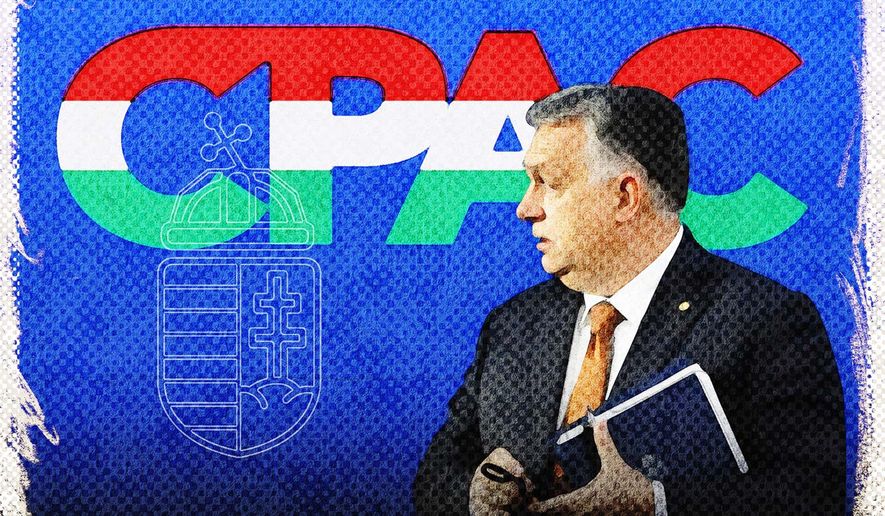OPINION:
About two weeks ago, Hungary played host to CPAC, a gathering of conservative political stakeholders, experts and interest groups. Led by the American Conservative Union, CPAC has had a number of such gatherings outside the U.S., including in Brazil, Australia, South Korea and Japan. This was the first one of its kind in Europe.
It was a momentous event. The message was upbeat, focusing on age-old conservative themes of God, homeland and the family. “The cause of the nation is not a matter of ideology, nor even of tradition,” said Prime Minister Viktor Orban at the opening. “The reason that churches and families must be supported is that they are the building blocks of the nation. This also means that one must remain on the side of the voters.”
The conservative vision brings answers to some of the most difficult questions confronting us today — questions about national identity and preserving our Judeo-Christian heritage, immigration and family. And as the prime minister and speaker after speaker said, these ideas enjoy the support of the people, which is why conservative movements should be emboldened to defend them.
Not surprisingly, that positive message did not come through in the fever-pitch reaction from liberal circles. But what was unusual this time around was just how vociferous and extreme Orban-government critics became.
One op-ed drew a direct comparison between CPAC Hungary and Nazism. Others made allusions to fascism, including a blogger who condemned Hungary for being a “largely white country” that has “installed a proto-fascist, white nationalist government.”
This gathering, they claimed, is merely a meeting of figures who are “endorsing Vladimir Putin’s closest ally in Europe.” According to some, Mr. Orban’s government “has curtailed institutional checks,” “railed against immigration and LGBTQ rights,” and even “turned replacement theory into state ideology.” Our message was, allegedly, “venomous” and “deadly.”
The obsession was telling, and as usual, they got a lot wrong.
Many remain confused about our stance on the war in Ukraine, and our relationship with Russia, though Mr. Orban has been quite clear. While we’re determined to prevent Hungary from being dragged into the conflict, Hungary was among the first ones to condemn Russia’s invasion as an act of aggression and Hungarians have rallied in unity behind a historical humanitarian effort. These facts are ignored.
Foreign Minister Peter Szijjarto explained clearly our refusal to supply arms when he said that “the start of weapons deliveries would immediately get Hungary involved in the war because they would become military targets.” But we’ve been as clear as anyone in our condemnation of the aggression and our support for Ukraine’s territorial integrity. “Hungary,” said President Katalin Novak in her inauguration speech, “will forever say no to any attempt aimed at restoring the Soviet Union.”
At a time when we are seeing news of Paris and Berlin reportedly proposing settlements with Russia that would require Ukraine to make territorial concessions, it’s more than a little cynical to refer to Mr. Orban as Putin’s “closest ally” in Europe.
We have a clear and firm position on illegal migration and for that, we come under heavy fire. In 2015, the worst year of the migration crisis, Mr. Orban was the first European politician to say out loud that “help must be taken where there is trouble, instead of bringing the trouble over here.” Hungary has repeatedly said no to uncontrolled immigration and refused various migrant quotas and resettlement schemes.
Does that make us peddlers of racist theories? No. When you have over 1.8 million people enter your territory illegally, as the EU had that year, with hundreds of thousands of them crossing through Hungary, you tend to see these things differently. And our firm position enjoys the overwhelming support of Hungarian voters.
Similarly, it wasn’t a walk in the park to launch Europe’s most generous family support system, as Mr. Orban and his governments had to tackle multiple obstacles, including the criticism of mainstream, liberal media. But when one has the right goal in sight, in this case making life easier for Hungarian families and combating demographic decline, no wall is too high.
More recently, our critics claim we’re treading on LGBTQ rights when it’s perfectly clear that our laws are about children and making sure that decisions about the sex education of our children remain the sole right of parents. It’s a debate where we cannot afford to back down, as a decisive majority of Hungarians expressed their support for this policy in the April 3 referendum.
Our critics ignore facts and instead try to smear us with charges of fascism and white supremacy precisely because the liberal, globalist camp is threatened by the success of our national conservative government. They don’t want to talk about how Hungary has turned around under the Orban government since 2010. We all but eradicated unemployment and brought people back into the labor force, sent the IMF packing, considerably decreased state debt, reigned in deficits, curbed utility prices and raised the minimum wage in 2022 to a level higher than the average wage during the previous, socialist government. Once we weathered the worst of the COVID-19 pandemic, Hungary’s economy was among the first ones to bounce back.
Experience tells me that when the other camp becomes this hysterical, it’s because we’re doing something right.
• Zoltan Kovacs is the international spokesperson of the Hungarian government.




Please read our comment policy before commenting.